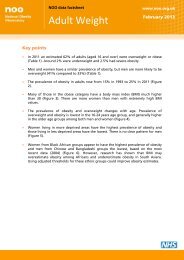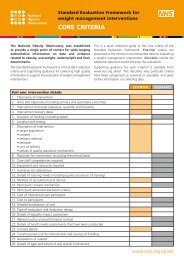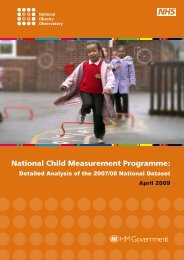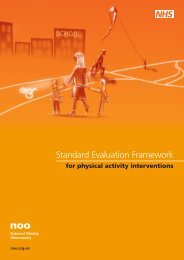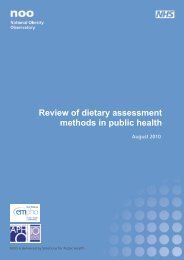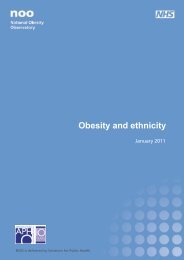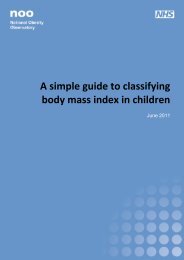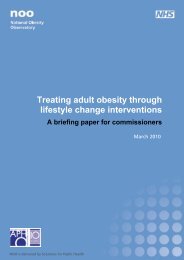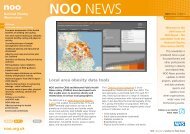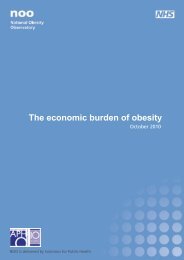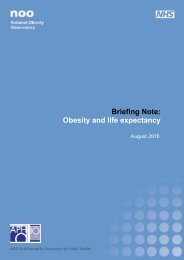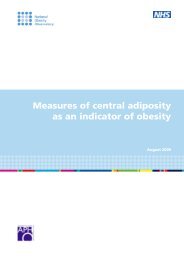Knowledge and attitudes towards healthy eating and physical activity:
Knowledge and attitudes towards healthy eating and physical activity:
Knowledge and attitudes towards healthy eating and physical activity:
Create successful ePaper yourself
Turn your PDF publications into a flip-book with our unique Google optimized e-Paper software.
Appendix 1: glossary of terms<br />
Attitude The way a person responds to people, concepts <strong>and</strong> events in an evaluative<br />
way.<br />
Behaviour The actions by which an individual adjusts to their environment.<br />
Belief Confidence or trust in a given opinion in the absence of rigorous proof.<br />
Body Mass Index (BMI) A measure of body mass calculated by dividing weight in<br />
kilograms by height in metres squared. The recognised categories for BMI are:<br />
BMI less than 18.5 – underweight<br />
BMI 18.6 – 24.9 – <strong>healthy</strong> weight<br />
BMI 25 – 29.9 – overweight<br />
BMI 30 – 39.9 – obese<br />
BMI 40 or more – morbidly obese<br />
Cognitive therapy A type of psychotherapeutic treatment that attempts to change<br />
feelings <strong>and</strong> behaviours by changing the way a person thinks about or perceives<br />
significant life experiences.<br />
Determinant A factor or circumstance that affects an outcome or behaviour.<br />
Emotion A complex pattern of changes, including physiological arousal, feelings,<br />
cognitive processes <strong>and</strong> behavioural reactions, made in response to a situation<br />
perceived to be personally significant.<br />
Incentives External stimuli or rewards that motivate behaviour.<br />
Motivation The process of starting, directing <strong>and</strong> maintaining <strong>physical</strong> <strong>and</strong><br />
psychological activities. This includes mechanisms involved in preferences for one<br />
<strong>activity</strong> over another <strong>and</strong> the vigour <strong>and</strong> persistence of responses.<br />
Non-response bias Where results of a survey may be affected by particular groups of<br />
individuals choosing not to answer specific questions.<br />
Opinion A personal view, attitude or appraisal.<br />
Perception The process by which a person detects <strong>and</strong> interprets external stimuli.<br />
Response bias Where results of a survey may be affected by individuals, who are<br />
interested in the subject matter, being more likely to consent to take part.<br />
Sample bias Where the results of a survey may be affected by the use of a sample<br />
that is not representative of the population of concern.<br />
Self-efficacy The set of beliefs that one can perform adequately in a particular<br />
situation.<br />
NOO | <strong>Knowledge</strong> <strong>and</strong> <strong>attitudes</strong> <strong>towards</strong> <strong>healthy</strong> <strong>eating</strong> <strong>and</strong> <strong>physical</strong> <strong>activity</strong>: what the data tell us 27



